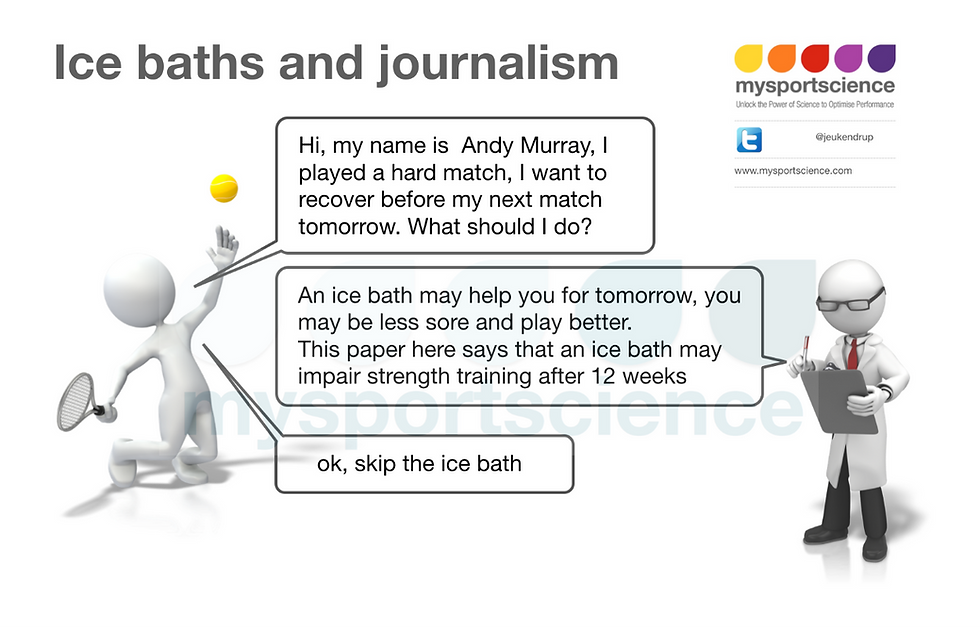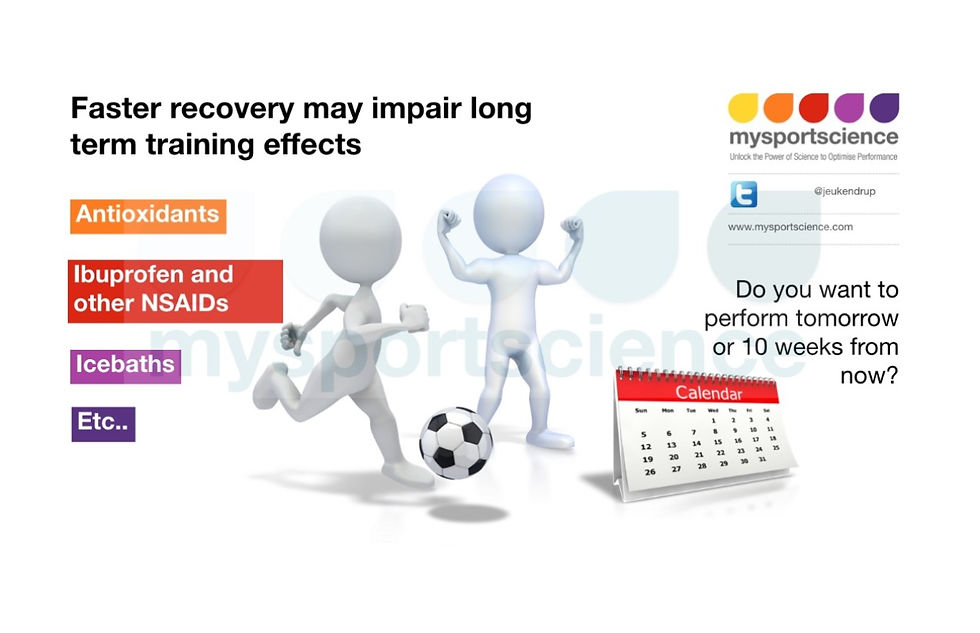A couple of weeks ago a paper was published in the Journal of Physiology with the title “Post-exercise cold water immersion attenuates acute anabolic signalling and long-term adaptations in muscle to strength training”. Essentially the study compared the effects of cold water immersion and active recovery on changes in muscle mass and strength after 12 weeks of strength training. After 12 weeks of training, effects were better with active recovery versus cold water therapy.

In the past studies suggested that cold water therapy can reduce soreness and improve recovery he next day(s). The current study addresses the longer term effects (12 weeks) of training, not the short term effects. Dr Shona Halson discussed this recently in a very nicely balanced blog on mysportscience. The essence of her story, based on the balance of evidence: whether you should use an ice bath or not depends on your goal. If you want short term recovery (before the next heat or match, it helps recovery), if your main goal (a competition for example) is weeks away daily ice baths may not help you. In other words: the context is extremely important. If someone wants to recover quickly, an ice bath may be a good idea. One could argue that the evidence is not incredibly strong, but this paper did not do anything to weaken these arguments because they simply did not study these effects.
If you want short term recovery (before the next heat or match, it helps recovery), if your main goal (a competition for example) is weeks away daily ice baths may not help you.
The authors of the paper in the Journal Physiology added a seemingly harmless word of caution at the end of their paper: Individuals who use strength training to improve athletic performance, recover from injury or maintain their health should therefore reconsider whether to use cold water immersion as an adjuvant to their training.
What happened next seems to be typical in the world of journalism today… It started with a press release from from QUT (Queensland University of Technology):
They wrote:
If the thought of a post workout ice bath is enough to make you shiver, new research from QUT and The University of Queensland (UQ) will warm your heart.
Really??
And the title of the press release was:
Research pours cold water on ice bath recovery theory
A good mark for catchy-ness, a poor mark for accuracy… Does the study our cold water on the theory? No! The study did not look at acute recovery, where ice baths seem to help. It looked at the long term effects. So the theory still holds, but it may also be important to consider the long term effects. But we knew this already… The problem is that the context is lost. If Andy Murray takes an ice bath between matches, is he interested in his performance 12 weeks later? Or does he want to be in the best possible shape back on court he day after?
The authors may be to blame a little as well because the following comment by one of the researchers was added to the press release: “the results suggested people should steer clear of ice baths -- at least after strength training sessions.”
This news was rapidly picked up by newspapers. And this is where the fun begins. A fight for the most provocative and attention grabbing headline:
Bin the painful ice baths - opt for a gentle cool-down instead, warn experts
The Independent, Ireland 5 Oct
Ice baths, treatment of choice for Andy Murray and Mo Farah, do not help post-exercise recovery - new research
The Telegraph 5 Oct
Sorry Mo (Farah), an ice bath does not help you recover
Daily Mail 5 Oct
Sorry Andy (Murray) and ice bath does not help you recover
Scottish Daily Mail, 5 Oct
Hot news for athletes: a gentle warm down is just as effective as an Ice bath
The Daily Telegraph, 5 Oct
In all these reports the balance is lost and the context is missing. It is about catchy one liners, not about meaningful content. The message that most readers will take away, is that ice bath don’t work. The newspapers had their headlines and it is up to practitioners who work with athletes on a daily basis to clean up the mess.
In this case everyone is to blame: the researchers, the University, the newspaper. And it is of course not an isolated case. More and more this seems to become the norm. Everyone loves a good headline, but let’s try to be less superficial than that..

Note: I am not a big believer in ice bath. There is some evidence though for acute effects. This article does not criticise the article in J physiol. I think it is a great paper, a solid study that provides further support for existing thoughts and is aligned with other work. This blog is about the reporting of science in the media and how we communicate science from a lab and bring this to the masses.







